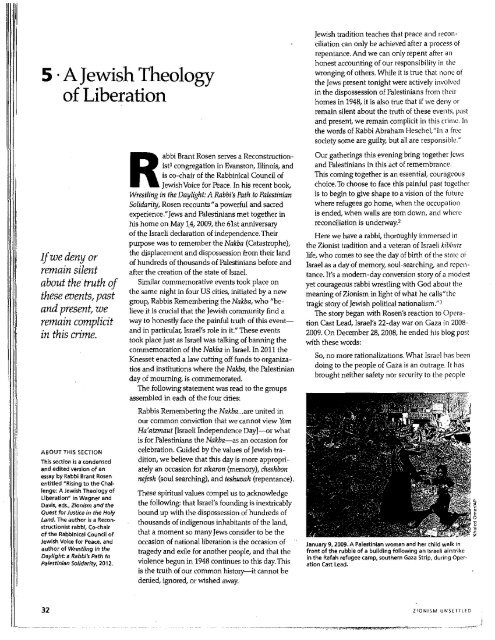zionism_unsettled_scan
zionism_unsettled_scan
zionism_unsettled_scan
Create successful ePaper yourself
Turn your PDF publications into a flip-book with our unique Google optimized e-Paper software.
II<br />
5 . A Jewish Theology<br />
of Liberation<br />
Jewish tradition teaches that peace and reconciliation<br />
can only be achieved after a process of<br />
repentance. And we can only repent after an<br />
honest accounting of our responsibility in the<br />
wronging of others. While it is true that none of<br />
the Jews present tonight were actively involved<br />
in the dispossession of Palestinians from their<br />
homes in 1948, it is also true that if we deny or<br />
remain silent about the truth of these events, pust<br />
and present, we remain complicit in this crime. In<br />
the words of Rabbi Abraham Hesche!, "In a irce<br />
society some are guilty, but all are responsible."<br />
"<br />
ii<br />
,I<br />
'I<br />
ji<br />
Ifwe deny or<br />
remain silent<br />
about the truth of<br />
these euents, past<br />
and present, we<br />
remain complicit<br />
in this crime,<br />
Rabbi Brant Rosen serves a Reconstructionist<br />
1 congregation in Evanston, illinois, and<br />
is co-chair of the Rabbinical Council of<br />
Jewish Voice for Peace. In his recent book,<br />
Wrestling in the Daylight: A Rabbi's Path to Palestinian<br />
Solidarity, Rosen recounts If a powerful and sacred<br />
experience."Jews and Palestinians met together in<br />
his home on May 14, 2009, the 61st anniversary<br />
of the Israeli declaration of independence. Their<br />
purpose was to remember the Nakba (Catastrophe),<br />
the displacement and dispossession from their land<br />
of hundreds of thousands of Palestinians before and<br />
after the creation of the state of Israel.<br />
Similar commemorative events took place on<br />
the same night in four US cities, initiated by a new<br />
group, Rabbis Remembering the Nakba, who "believe<br />
it is crucial that the Jewish community find a<br />
way to honestly face the palnful truth of this eventand<br />
in particular, Israel's role in it." These events<br />
took place just as Israel was talking of banning the<br />
commemoration of the Nakba in Israel. In 2011 the<br />
Knesset enacted a law cutting off funds to organizatios<br />
and institutions where the Nakba, the Palestinian<br />
day of mowning, is commemorated.<br />
The following statement was read to the groups<br />
assembled in each of the four cities:<br />
Our gatherings this evening bring together Jews<br />
and Palestinians in this act of remembrance.<br />
This coming together is an essential, courageous<br />
choice. To choose to face this painful past together<br />
is to begin to give shape to a vision of the future<br />
where refugees go horne, when the OCCllPCltioll<br />
is ended, when walls are tom down, and where<br />
reconciliation is underWay.2<br />
Here we have a rabbi, thoroughly immersed in<br />
the Zionist tradition and a veteran of Israeli kibbutz<br />
life, who comes to see the day of birth of the state of<br />
Israel as a day of memory, soul-searching, and repelltance.<br />
It's a modem-day conversion story of a modest<br />
yet courageous rabbi wrestling with God aboLit the<br />
meaning of Zionism in light of what he calls"thc<br />
tragic sto!), of Jewish political nationalism.'"<br />
The story began with Rosen's reaction to Operution<br />
Cast Lead, Israel's 22-day war on Gaza in 2008-<br />
2009. On December 28, 2008, he ended his blog post<br />
with these words:<br />
So, no more rationalizations. What Israel hus been<br />
doing to the people of Gaza is an outrage. It has<br />
brought neither safety nor security to the people<br />
I<br />
ABOUT THIS SECTION<br />
This section is a condensed<br />
and edited version of an<br />
essay by Rabbi Brant Rosen<br />
entitled "Rising to the Challenge:<br />
A Jewish Theology of<br />
Liberation" in Wagner and<br />
Davis, eds., Zionism and the<br />
Quest for Justice in the Holy<br />
Land. The author is a Reeon·<br />
structionist rabbi, Co-chair<br />
of the Rabbinical Council of<br />
Jewish Voice for Peace, and<br />
author of Wrestling in the<br />
Daylight: a Rabbi's Path to<br />
Palestinian Solidarity, 2012.<br />
Rabbis Remembering the Nakba ... are united in<br />
our common conviction that we cannot view Yom<br />
Ha'atzmaut [Israeli Independence Day]-or what<br />
is for Palestinians the Nakba-as an occasion for<br />
celebration. Guided by the values of Jewish tradition,<br />
we believe that this day is more appropriatelyan<br />
occasion for zikaron (memory), cheshbon<br />
nefesh (soul searching), and teshuvah (repentance).<br />
These spiritual values compel us to .acknowledge<br />
the following: that Israel's founding is inextricably<br />
bound up with the dispossession of hundreds of<br />
thousands of indigenous inhabitants of the land,<br />
that a moment so many Jews consider to be the<br />
occasion of national liberation is the occasion of<br />
tragedy and exile for another people, and that the<br />
violence begun in 1948 continues to this day. This<br />
is the truth of our common history-it cannot be<br />
denied, ignored, or wished away.<br />
January 9, 2009. A Palestinian woman and her child walk in<br />
front of the rubble of a building following an Israeli airstrike<br />
in the Rafah refugee camp, southern Gaza Strip, during Operation<br />
Cast lead.<br />
32<br />
ZIONISM UNSETTLED


